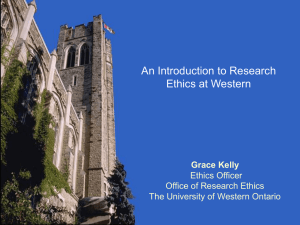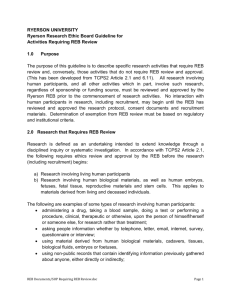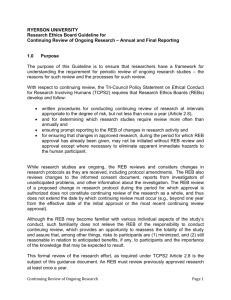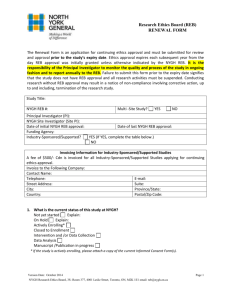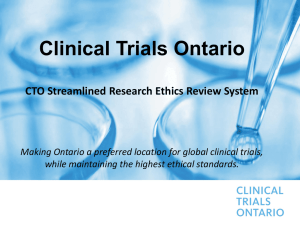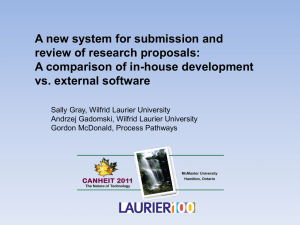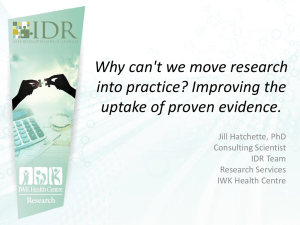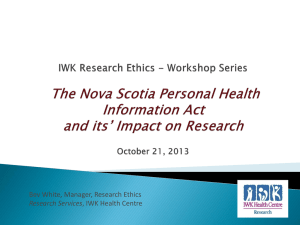Session 1 - IWK Health Centre
advertisement
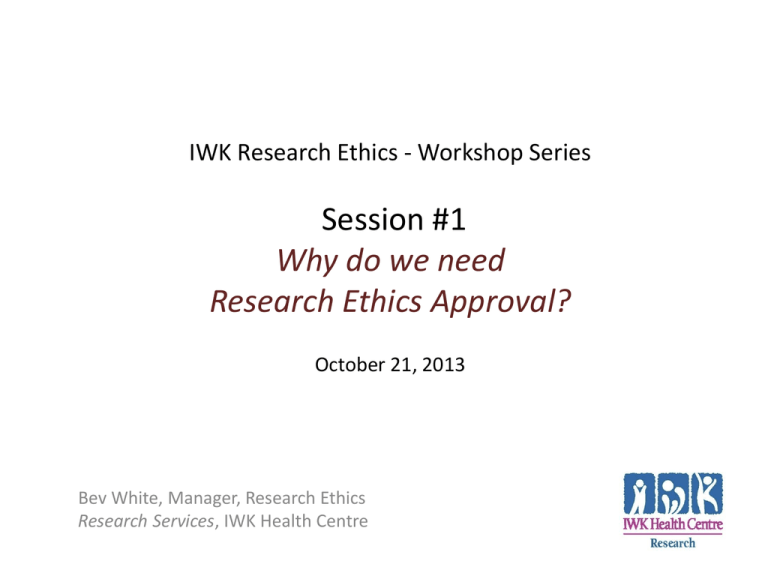
IWK Research Ethics - Workshop Series Session #1 Why do we need Research Ethics Approval? October 21, 2013 Bev White, Manager, Research Ethics Research Services, IWK Health Centre Objectives • Research Ethics Review – why do we have it? • Mandate/Role of the REB • Guidance documents – TCPS2, Division 5, ICH-GCP, PHIA, etc… • Specific Issues of Interest – – – – – Scholarly review Privacy Trainees Badly written protocols/consent documents Secondary use of data • Resources to navigate the REB • Questions Research Ethics Review Nuremberg Code (1947) Universal Declaration of Human rights (1948) Tuskegee, Willowbrook (1932/72, 1960/70) Declaration of Helsinki (1964) – modified x 5 MRC/Canada Council Guidelines (1978) Health Canada – ICH-GCP (1997) TriCouncil Policy Statement – 2 (CIHR, NSERC, SSHRC) (1998, 2010, 2013?) Why? Because we should – Social responsibility – Integrity of research – “The right thing to do” Because we must – Legislated requirements – Guidance documents Research Ethics Guidance Documents and Regulations • TCPS-2 Applies to all human research • Division 5 Health Canada legislation • ICH-Good Clinical Practices Adopted by Health Canada - Applies to Clinical Trials • Best Practices for Health Research Involving Children and Adolescents http://www.pediagen.org/ressources/BestPratice.pdf •Personal Health Information Act - PHIA US Regulations - Office of Human Research Protections - OHRP CFR 45, Part 46 - Department of Health and Human Services, Protection of Human subjects CFR 21, FDA – Protections of Human Subjects, IRB(REB), Drugs & Devices TCPS2 The TCPS2 describes principles, standards and procedures for governing research involving humans. The TCPS2 applies to all research involving human or human tissues affiliated with, and undertaken by members of, research institutions administering funds awarded by any of the three federal granting agencies (CIHR, NSERC and SSHRC). It includes new chapters: •Multi-Jurisdictional Studies, (Ch. 8), •First Nations, Inuit & Métis Research (Ch. 9) •Qualitative Research (Ch. 10) TCPS2 Addresses the interdependent duties shared by researchers, institutions and REBs Articulates and updates ethical norms - encourages continued reflection on complex ethical issues. Seeks to avoid imposing one disciplinary perspective Harmonize the ethics review process TCPS2 • Recognizes need for research – Basic desire for new knowledge – Advance knowledge for the benefit of subjects – Benefits particular groups and society Original 7 principles that form the basis for respect for human dignity • • • • • Respect for Justice and Inclusiveness. Balancing Harms and Benefits. Minimizing Harm Maximizing Benefit Requirement for Free and Informed Consent. • Respect for Vulnerable Persons. • Respect for Privacy and Confidentiality. Core Principle Respect for Persons (Human Dignity) • Treat subjects as autonomous beings Fully informed consent Voluntary participation • Respect the right to privacy Participant anonymity • Protect subjects with limited autonomy Special treatment of vulnerable populations Third party consent Data confidentiality Core Principle Concern for Welfare – Do Good (Beneficence) Minimize Harm • Study design • Subject screening and exclusion • Risk assessment Maximize Benefits • Benefits to subject • Benefits to society Risk/Benefit • Benefits should outweigh risks Core Principle Justice – Be Fair • Distribute benefits and risks equitably • Avoid exploitation of vulnerable populations Link risks to benefits Allow all groups access to benefits of research Select subjects equitably Mandate • REB structure and function dictated by the Tri-Council Policy Statement on Ethical Conduct for Research Involving Humans – Explicit instructions regarding all aspects • All organizations and institutions receiving funding from the Tri-Agencies (CIHR, NSERC, SSHRC) must comply with TCPS2 TCPS2 Section1 Article A1.1 • All research that involves living human subjects requires review and approval by an REB “…before research is started” • Research is defined as “systematic investigation to establish facts, principles or generalizable knowledge” includes both quantitative and qualitative methodologies : surveys, questionnaires, interviews, human sampling (tissues), human testing (physiological / psychological), human observation (behavioral investigations) clinical investigations Scope of research needing review • • • • • Whether the research is funded or not Whether the subjects are from inside or outside the university Whether subjects are paid or not Whether the research is inside or outside of Canada Whether the research is conducted inside or outside the university • Whether the research is conducted by staff or students • Whether the research is conducted in person or remotely Scope of research needing review Whether the research is to be published, or not Whether the research is collected from subjects or from records not in the public domain (e.g. database research) Whether the research is observational, experimental, correlational or descriptive Whether or not a similar project has been approved elsewhere Whether the research is a pilot study or a fully developed study Whether it is basic or applied research Whether the research is for teaching or training or for the acquisition of new knowledge What doesn’t need ethics review? Research using publicly available information • Archival or literature-based studies • Research about ‘public figures’ using published information or thirdparty interviews • Observation of public events Quality Assurance (Q/A) studies • Program evaluations for direct local application • Performance reviews (educational purposes) Secondary Use of Data • TCPS2: “Use in research of data contained in records collected for a purpose other than the research itself” – e.g. Health Records • “If identifying information is involved, [full] REB approval shall be sought” – Justification for use of identifying information – Protection of privacy and minimization of harms – Individuals have not objected to secondary use • If no identifying information, still need REB review and approval – Generally will be expedited Role of the REB TCPS2 – Chapter 6 - Governance of the REB • Independent Authority • REB mandate is to review and then approve, reject, propose modifications or halt proposed or ongoing research involving humans at the institution. • Institution may not override decisions Research Ethics Board Membership (minimum 5) • 2 members with broad expertise in scientific methods • 1 member knowledgeable in ethics • 1 member knowledgeable in law • 1 member from community Institutional Accountability • Each local REB must review research in multi-center research • There must be local (international site) and institutional (home institution of investigator) review for international research • Grant awards DO NOT EQUAL REB approval (you may not begin recruitment, data collection until you have written REB approval Not the Role of the REB • NOT to obstruct the conduct of research • NOT to rewrite badly constructed consents • NOT to revise badly written protocols • NOT to require idiosyncratic changes to protocols or consents • NOT to nit-pick protocols Common Ethical issues in research… • Disclosure of illegal activities • Disclosure of child / adult abuse • Disclosure of previously unknown diagnoses (mental or physical) • Significant physical discomfort / harm • Significant emotional / psychological distress REB Review - Initial Full Review Delegated Review – Minimal Risk • Primary and secondary reviewer • Primary and secondary reviewer assigned • All REB members read submission • Other REB members read submission, only if moved to full review • Face-to-face discussion • Written recommendations – Major & minor revisions • Written recommendations – Major & minor revisions • Appeals process, if impasse • Appeals process, if impasse REB Review - Ongoing • All ongoing research requires annual review (proportionate to risk) – – – – – – Review of consent process Safety monitoring committee Review of study documents Review of adverse events Review of patient charts Random audit Practical Issues • Allow time to prepare REB submission • REB requires review of project by supervisor • Submission deadlines o IWK – 1st Tuesday of the month – REB meets on the 3rd Tuesday of the month (no meeting Jan & Aug) o CDHA – Every Friday – 6 days prior to the meeting, REB meets every Monday • Delegated review (minimal risk) projects can be submitted at any time at the IWK. Practical Issues Follow the instructions on the website Add a cover letter if there are special circumstances that the REB needs to be aware of Provide point by point responses to all items Revisions - Highlight changes in relevant documents; Consents, etc. Revisions - Remember to change version date Consider your submission package to be the first step in your conversation with the REB Practical issues - Continuing Review • Annual review will require summary of progress to date, unanticipated problems, recruitment. • If a change is needed for any reason during the conduct of the project – an amendment to REB must be submitted. Include revised consent documents (or related materials) with changes highlighted. • The REB and Research Services are here to help you Protecting Research Participants • Ensure all research is conducted ethically • Based upon ethical principles – Respect for individuals – Minimize risk/maximize benefit – Justice and Inclusiveness (Be fair) • “Aim is to prevent unintentional use of a human being solely as a means toward even a legitimate end”. Protecting Investigators & the Institution • Be aware of and vigilant for issues which may compromise participant safety • Assist investigators in developing research which meets relevant regulations • Educate investigators in issues of research ethics Scholarly Review • Has been a sore point • “Bad science cannot be good ethics” • TCPS2: “The REB shall satisfy itself that the design of a research project that poses more than minimal risk is capable of addressing the questions asked in the research” • “Avoid duplicating previous professional peer-review assessment unless there is a good and defined reason for doing so”. What is research ethics about? • Applying the principles of ethics to a particular research context • Three main principles: – Respect for Persons (Free & Informed) – Concern for Welfare (Beneficence … “Do good”) – Justice (Equality & Inclusiveness ….“Be fair”) Informed Consent • A process, not a piece of paper, BUT… • TCPS2: “Researchers shall provide … full and frank disclosure of all information relevant to free and informed consent” • “Must ensure that prospective subjects are given adequate opportunities to discuss and contemplate their participation” Essential Elements • Research study • “Comprehensible statement of purpose” • “Comprehensive description of reasonably foreseeable harms and benefits” • Free not to participate • Free to withdraw • Commercialization • Conflicts Provision of new information as available Contacts Ethics contact Confidentiality Subject responsibilities Study termination Costs/payments Alternatives Provision of results Consent TCPS2 - Waiver of consent if all the following met: 1. No more than minimal risk, 2. Waiver unlikely to affect rights of subject, 3. Research cannot be practically carried out, 4. Subjects will be provided with additional info, when possible, AND 5. Consent does not involve a therapeutic intervention. PHIA – Consent of the subject individuals is required unless a REB has determined that the consent is not required, or that it is impracticable to obtain consent. Assent (Dissent) - children The discussion process with a Child taking part in research based on “Authorization” from their parent (or guardian) Involving participants in decision-making when they do not have the ability to provide informed consent. ◦ Respect children as persons ◦ Honour developing autonomy ◦ Respect parent’s roles in guiding moral development ◦ Flexibility is key Seeking assent may not always be appropriate. Dissent must be respected – if you ask, you must be prepared to respect a “NO” answer. Assent (Dissent) - elements • • • • • • • • Provide appropriate information Include children in decision-making Integrate family decision-making Process over time Determine capacity to assent Document assent process Process may be verbal…signature not required Pay attention to soliciting/respecting dissent Supporting Documentation • To do its job, REB needs all materials pertaining to the research – Complete protocol – Consent documents – Posters/flyers/advertisements – Budget – CV’s • EAS Form directed towards lay members of committee Privacy Legislation — Legislation governs the collection, handling, storage of personal information, including research records. ◦ PIPEDA - Personal Information Protection and Electronics Documents Act ◦ Nova Scotia Hospitals Act ◦ PIIDPA - Nova Scotia Personal Information International Disclosure Protection Act ◦ PHIA - Nova Scotia Personal Health Information Act Guidance document ◦ CIHR Best Practices for Protecting Privacy in Health Research (2005) ◦ PHIA Toolkit Data Collection and Management • Affects – What data you collect (minimum) – How you handle it (storage, sending out) – How long you keep it • Impact on recruiting – “Initial contact with individuals about a research project should be made by someone that individuals would expect to have relevant information about them” • Future contact ask for permission Ethics Review in Clinical Trials • ICH-Good Clinical Practices – Adopted by Health Canada – Applies to Clinical Trials • Division 5 – Health Canada legislation Clinical Trial Application • In September 2001 Health Canada Food and Drug Regulations (Part C, Division 5) were amended to require sponsor submission of a clinical trial application (CTA) for drug trials. • http://www.hc-sc.gc.ca/dhp-mps/compliconform/index_e.html Clinical Trial Application • Following receipt of a CTA by a study sponsor and Health Canada's internal review: – 'No objection letter' or – 'Not satisfactory notice' is issued by Health Canada. • IWK REB withholds its REB approval pending receipt of a copy of the study's 'No objection letter'. • Investigators are encouraged to initiate the CTA process early. • Protocol amendments need to be submitted to Health Canada for approval. Clinical Trial Application • A similar Health Canada review and approval process exists for Natural Health Products and Medical Devices: • Clinical trials involving natural health products. Under the Natural Health Products Regulations – Web site: http://www.hc-sc.gc.ca/dhpmps/prodnatur/applications/clini/index_e.html • Clinical trials involving medical devices: – http://www.hc-sc.gc.ca/dhp-mps/md-im/applic-demande/guideld/test_md3_im3_main_principal-eng.php Research Ethics Cooperation Agreement – IWK, CDHA, Dal • Dal Health Sciences REB accepts IWK or CDHA review • IWK and CDHA do not accept Dal review, if patient related • IWK and CDHA can not accept each other’s review, if patient related Memorandum of Understanding IWK, CDHA • Researchers who have dual appointments – the REB of record will forward copy of approval to the other institution • Expedited review – Advertisements and Use of Resources • Industry funded research - conducted at both institutions requires full Board review by both institutions. REB Audit – Typical Results • Research records taken out of Health Centre • Study documents misplaced – Health Canada requires originals • Protocol changes without REB approval • Personnel changes without amendment • Personal health information on laptops Contacts • IWK Health Centre - REB guidelines http://www.iwk.nshealth.ca/research/application-materials-forms Bev White – 470-8520 bev.white@iwk.nshealth.ca Joanne Street – 470-7879 joanne.street@iwk.nshealth.ca • Dalhousie Office of Research Ethics Administration http://researchservices.dal.ca/research_1482.html Catherine Conner, Director – 494-1462 • CDHA Research Ethics Board http://www.cdha.nshealth.ca/discovery-innovation/ethics Ken Jenkins, Manager – 473-8426 Questions?
